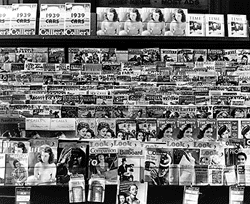
Elijah Cummings was angry. The Democratic congressman from Baltimore represents a district that is home to the Afro-American Newspaper, a weekly publication that is in jeopardy of going out of business due to the United States Postal Service’s recent rate hike on small periodicals. Cummings’ testiness showed when a House subcommittee heard testimony on the rate increase from a host of postal officials earlier this week.
“If these small publications go out of business, is that a win-win?” Cummings asked James Miller, chairman of the USPS’s Board of Governors, the entity that approved the rate hikes, during one tense exchange.
“That’s a hypothetical,” Miller protested.
“Nah, nah, nah,” Cummings said. “You got a lot of businesses that put out publications that are saying that this is going to affect them in a negative way…. I’m asking you a simple question. If they go out of business, is it a win-win?”
“I would say if they cannot cover their costs, it is a win-win situation,” said Miller. “Let me tell you why I think that. Because other classes of mail would be covering their costs.” He went on to explain that every American letter writer pays 200 percent of the cost of shipping his or her letter because small magazines and periodicals don’t pay their fair share.
“So your answer is, it’s a win-win for everybody but the people who go out of business,” Cummings retorted.
“Yes, yes,” Miller said, adding, “It’s not that I’m heartless. It’s not that we’re heartless. We have to cover all sides. And I think the fairest thing is for every class of mail to cover the cost directly attributable to carrying their mail.”
The problem is, Miller’s comments muddled the issue, to put it charitably. Since the 1970s, all classes of mail have been required to cover the costs associated with their delivery, what’s called attributable cost. But periodicals, as a class, get favorable treatment: They don’t pay overhead, meaning that they don’t foot the bill for the Postal Service’s infrastructure, employees, and so on.
That’s a tradition that goes back to the origins of the nation. The founding fathers saw the press as the lifeblood of democracy—only informed voters could compose a true democracy, they believed—and thus created a postal system that gave favorable rates to small periodicals. (George Washington actually supported mailing newspapers for free.) For 200 years, small periodicals and journals of opinion were given special treatment.
The 2007 rate hikes, which went into effect this summer, changed that. Now, periodicals are still expected to cover attributable costs and pay no overhead, but because the cost of delivering mail has gone up, rates within the class have gone up as well. In advance of the rate hike, the Postal Service submitted a proposal to the Postal Regulatory Commission that would have raised the rates in the class more or less evenly. The PRC rejected the proposal in favor of a rate package put forward by Time Warner that, unsurprisingly, hands small periodicals much steeper rate hikes than their large counterparts.
Small periodicals in some instances face a rate hike of up to 50 percent. An increase of that size is almost unbearable for periodicals that publish frequently, like the liberal Nation or the conservative National Review, both weeklies. For them, postal expenses make up a massive portion of their budgets. An increased cost of $500,000 per year, which is The Nation‘s estimate, would be devastating. (The rate hike is a smaller burden for Mother Jones, due to the fact that the magazine publishes six times a year. Nevertheless, Mother Jones opposed the rate hike earlier this year.)
Small periodicals and their devotees have been complaining about the rate scheme for months, but without the money for lobbyists and lawyers they’re left only to fight the battle through petitions and rhetoric. Says Victor Navasky, publisher emeritus of The Nation, “These journals, whose core franchise is public discourse about public affairs, are—like water, national defense, public highways, and public education—a public good and as such it would seem to me ought to be paid for out of public funds.”
That’s not the sort of argument that is going to find sympathetic ears with Miller, who, in a long career in and around public service, has always shown a desire to privatize. In the Reagan Administration, Miller was executive director of a Presidential Task Force on Regulatory Relief, chairman of the Federal Trade Commission, and director of the Office of Management and Budget. When Miller left the administration in 1988, President Reagan commended him for playing “a leading role in removing the shackles of excessive regulation from our economy.” Miller later sat on the board of Citizens for a Sound Economy, now called FreedomWorks, whose stated mission is “lower taxes, less government, more freedom.”
Faced with opponents this powerful Navasky and his colleagues can do little, especially considering the rate hikes have already been passed and no one has a plan for undoing them. “I’m just trying to figure out if we’re here wasting our time,” an exasperated Cummings said at the hearing this week. The best the panel of postal authorities could offer was that it was for the sake of “discussion.” For small periodicals, the only discussion is whether or not they’ll have to shut their doors.












